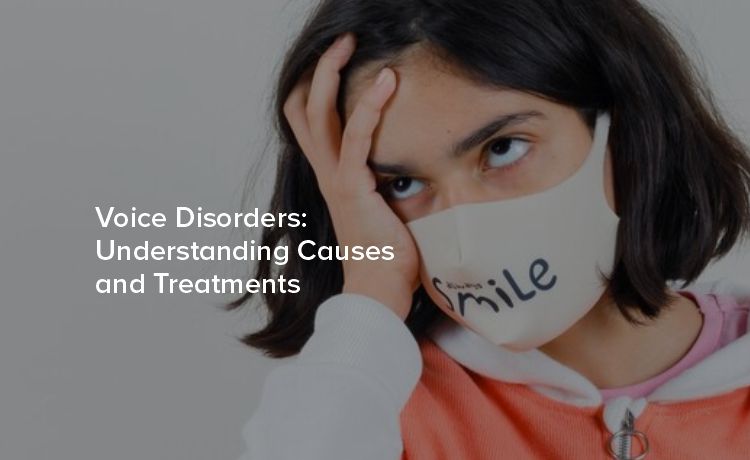
Imagine trying to express yourself, but your voice just isn't co-operating. For many people, voice disorder may be a daily issue that impacts their communication and quality of life. Whether or not you are a teacher, singer, salesperson, or simply someone who loves to chat with friends and family, your voice is crucial.
Voice disorders occur when there's a problem with the vocal cords or surrounding structures. These disorders can cause changes in pitch, volume, and quality of the voice, making it difficult to speak clearly that can be understood.
Voice disorders can be broadly categorized into three types:
Functional Voice Disorders – Caused by improper use of the vocal cords without any physical abnormalities.
Organic Voice Disorders – Result from physical changes or damage to the vocal cords.
Neurological Voice Disorders – Caused by issues in the nervous system that affect the vocal cords.
Some common symptoms of voice disorders include:
Voice disorders can affect various aspects of life, from professional performance to personal relationships. Understanding these issues can help in managing and seeking treatment.
can arise from a multitude of causes, each influencing the voice in different ways.
Often, voice disorders are the result of misuse or overuse of the vocal cords. This is common in professions requiring extensive vocal use like teaching, singing, or coaching.
Certain medical conditions can lead to voice disorders. These include:
Vocal Cord Nodules and Polyps – Benign growths that develop on the vocal cords due to strain.
Laryngitis – Inflammation of the vocal cords often caused by infections or irritants.
Reflux Laryngitis – Acid reflux can irritate and damage the vocal cords.
Neurological disorders can impact the muscles and nerves that control the vocal cords. Conditions such as Parkinson's disease, multiple sclerosis, and vocal cord paralysis fall under this category.
Accurate diagnosis is essential for effective treatment. Several methods are employed to diagnose voice disorders.
Medical History and Physical Examination
A detailed medical history and physical examination by a healthcare professional is the first step in diagnosing a voice disorder.
Laryngoscopy
Laryngoscopy is a procedure used to view the vocal cords and larynx. It involves inserting a small camera through the nose or mouth to get a clear view of the vocal cords.
Voice Evaluation
A voice evaluation by a speech-language pathologist can help assess the quality, pitch, and volume of the voice. This evaluation often includes recording and analyzing the voice.
Treatment for voice disorders varies based on the underlying cause and severity. Here, we discuss different approaches to managing these conditions.
Voice therapy is often the first line of treatment for voice disorders. It involves working with a speech-language pathologist to learn techniques that improve vocal health and function.
In cases where voice disorders are due to medical conditions, appropriate treatments like medication or surgery may be recommended. Examples include:
Medication – For conditions like acid reflux or infections.
Surgery – To remove nodules, polyps, or other growths on the vocal cords.
Making certain lifestyle changes can significantly improve voice disorders. These might include:
Prevention is always better than cure. Here are some tips to keep your voice healthy and prevent disorders.
Learning proper techniques for using your voice can prevent strain and damage. This includes proper breathing, maintaining good posture, and avoiding shouting or whispering.
Practicing good vocal hygiene is essential. This includes staying hydrated, avoiding irritants like smoke, and resting your voice when necessary.
Regular check-ups with a healthcare provider can help catch and address any issues early before they develop into more serious disorders.
Advancements in technology have revolutionized the way we diagnose and treat voice disorders.
Voice analysis software can help in evaluating and monitoring voice disorders. These tools provide detailed analysis of various aspects of the voice, aiding in accurate diagnosis and treatment planning.
Teletherapy allows individuals to receive voice therapy remotely. This is particularly beneficial for those who may not have access to specialized care in their area.
Innovations in surgical techniques have made procedures for treating voice disorders safer and more effective, with shorter recovery times.
Voice disorders can have a significant emotional and psychological impact. Addressing these aspects is crucial for comprehensive care.
Voice disorders can lead to social isolation due to difficulty in communication. Support groups and therapy can help individuals cope with these challenges.
Building confidence through therapy and support can improve the quality of life for those with voice disorders. Encouragement and positive reinforcement play a key role here.
Professional help from psychologists or counsellors can be beneficial. They can provide strategies to manage stress, anxiety, and depression resulting from voice disorders.
Supporting a loved one with a voice disorder can make a difference in their journey towards recovery.
Patience and understanding are crucial. Recognize the challenges they face and offer your support without judgement.
Encourage them to seek professional help and stick to their treatment plan. Celebrate small victories along the way.
Educate yourself about their condition. This knowledge can help you provide better support and understand their experiences.
Holistic approaches to treatment, including integrating mental health support and alternative therapies, are gaining popularity.
Increased awareness and education about voice disorders can lead to early diagnosis and better outcomes. Advocacy and support groups play a vital role in this.
Voice disorders are more common than many realize, but with the right knowledge and support, recovery is possible. Whether you're experiencing a voice disorder or supporting someone who is, understanding the causes, available treatments, and the emotional support can make a significant difference. contact with the top ENT Hospital in Hyderabad.